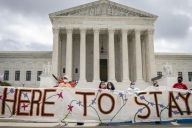You have /5 articles left.
Sign up for a free account or log in.

County College of Morris faculty members protesting on behalf of their laid-off colleagues in July 2021.
Claire Haviland
Five professors laid off by the County College of Morris in New Jersey two years ago may be poised to get their jobs back after a state hearing examiner recently issued a scathing ruling concluding that their layoffs were a retaliatory move related to their union activities.
The hearing examiner, appointed by the New Jersey Public Employment Relations Commission, concluded that the faculty members were “engaged in protected activity, CCM knew of the activity, and CCM was hostile toward the [Faculty] Association’s exercise of protected rights” and that the professors’ contracts weren’t renewed “in retaliation for protected union activity.”
The examiner recommended they be reinstated and given back pay.
The community college’s president has not publicly responded to the ruling and did not provide testimony for the hearing. Administrators now have a period of time to formally challenge the ruling. The commission will then decide on the case. If the college raises no objection, the hearing examiner’s conclusion will be final unless commissioners tell the affected parties within 45 days that they want to consider the matter further.
The laid-off professors say they feel vindicated by the ruling after two years of legal wrangling and are hopeful the commission will require the college to reinstate them.
“We’re just glad that the hearing examiner saw this for what it was,” said James Capozzi, who was the faculty union president and an assistant professor of English and philosophy before his dismissal. “It was flagrantly illegal. It was a very blatant attempt to break our union.”
Melissa Albright, a college spokesperson, said in an email that the college does not comment on ongoing legal proceedings.
Six tenure-track faculty members in all were abruptly laid off in April 2021. All were members of the college’s Faculty Association, but the ruling ultimately focused on five of the faculty members who were visibly active members of the association; one was president of the union and two were chairs of union subcommittees. All but one of the faculty members consistently had positive evaluations, and their department chairs were reportedly not consulted about their terminations, according to the ruling.
The ruling by Lisa Ruch, the state hearing examiner, notes that an April 2021 email sent to faculty members by Anthony J. Iacono, the college’s president, attributed the layoffs to enrollment declines and a re-examination of the ratio of tenured to non-tenure-track faculty members. (Enrollment at the college fell from 8,067 students in fall 2017 to 5,776 in fall 2021.)
The ruling also notes a May 2021 memo to faculty from Karen VanDerhoof, the college’s vice president for business and finance, that also cited a need for greater “flexibility” and low numbers of credit hours taught by faculty members in the departments affected by the layoffs.
Albright told Inside Higher Ed at the time of the dismissals that the decision was painful to Iacono and “definitely not” related to union activity. The college was financially stable but needed to make reductions to “keep it that way,” she said.
However, Ruch was unconvinced that the layoffs were necessary. She noted in her ruling that the college was not facing financial hardship at the time and that “there is no evidence showing that CCM had ever previously considered the need for flexibility or the proportion of tenured to non-tenured faculty when making recommendations for reappointment or tenure.”
She recommended the college be required to give the five faculty members their jobs back, with back pay, including the salaries and benefits they would have accrued if they had remained in their jobs.
Ruch also took issue with Iacono calling the local police department in April 2021 alleging the tires of a cart in his backyard had been slashed. According to the police report, Iacono named the laid-off professors as possible perpetrators. The officer who filed the report said he looked at the cart and believed the tires may have simply ripped because they were flat. The college’s assistant director of public safety then called the local police later that evening with contact information “for faculty members that were non-renewed as well as union members who may have caused the property damage,” and the professors were questioned.
“The details of this entire police incident are so extreme and problematic, especially because the police report itself raises questions about whether the alleged tire slashing occurred at all,” Ruch wrote.
Robb Lauzon, former chair of the union’s communication committee and an assistant professor of communication, was specifically identified by Iacono to the police as a possible suspect because he lived nearby.
“I’m not a bad person. I’m not out to do hooligan things. I’m a regular dude,” Lauzon said. “The idea that I would go in the middle of the night with a ski mask to the president’s house and slash the tires on his wheelbarrow is absurd.”
He said the ruling validates that he and his laid-off colleagues were justified in filing an unfair-practice charge with the state employment relations commission.
Lauzon said he started desperately applying for jobs after his layoff. He ultimately moved his family to Orlando for a communications postdoctoral fellowship position at the University of Central Florida. He said he loved the position and was grateful to stay in academia, but he was forced to take a pay cut and lost two years of saving for retirement and his daughter’s college fund. The stressors took a toll on his mental health and caused tensions and arguments at home.
“It was a rough two years, I’m not going to lie,” he said.
Geoff Peck, formerly an assistant professor of English at the college and chair of the union’s grievance committee, said he and his wife had been approved to buy a house in New Jersey right before the layoffs but had to scrap their plans. They moved so he could take an assistant professor of English position at Eastern Wyoming College and then moved again to Nevada for the same position at Truckee Meadows Community College, which he said was a better fit for his family.
“I wanted to keep teaching,” he said.
Peck said he found the ruling “incredibly gratifying” and he’s confident the commission will side with him and his former colleagues.
The union has been a thorn in the side of the college’s administrators in recent years and grew more active after Capozzi became the Faculty Association’s president in 2019, according to the ruling.

One of the signs put up on campus by the Faculty Association after the ruling.
Dee McAree
The ruling says Faculty Association leaders showed up at Board of Trustees meetings in 2019 to speak up about stalled contract negotiations and to support student journalists alleging intimidation by the administration. Union leaders also repeatedly sent messages to administrators raising various concerns, including about how the college addressed student complaints during the pandemic after pivoting to virtual learning.
Union leaders also sent a letter in 2020 to the Board of Trustees, raising concerns about a lawsuit against a local school district that mentioned the college president. The district is accused in the lawsuit of overlooking the harassment and bullying of a student after Iacono’s son allegedly sexually assaulted her. The plaintiffs, the girl who said she was assaulted, and her parents, alleged the district failed to address the issue in part because of the district’s “budding relationship” with the college after entering a dual-enrollment agreement, according to the lawsuit.
The faculty members received a sharp email response from an attorney retained by the college saying that their letter contained “false and defamatory statements” about the president and his family and demanding “an immediate, unconditional written retraction.”
But not all interactions between the union and the administration were fraught. Notably, Faculty Association leaders sent a letter to the Board of Trustees and Iacono in March 2021 thanking him for his leadership during the pandemic.
Tensions between the college and the union, however, have continued to simmer since the layoffs.
The dismissals were “terrifying” for faculty members, particularly those without tenure, and left some “concerned about being seen connected to the association,” said Dee McAree, the current president of the Faculty Association. The union remains active, however.
The Faculty Association issued a vote of no confidence in Iacono shortly after the layoffs, as did the union representing department heads, the Association of Academic Chairs and Assistant Chairs. The union also held a rally that summer to voice support for their former colleagues and urged various groups on campus to write letters to administrators, trustees and commissioners calling for the professors to be reinstated, McAree said. Sixty such letters were sent. The college’s labor and employment counsel then tried to prevent the union from holding a fall 2021 “meet and greet,” arguing the meeting violated COVID-19 protocols, even though the college had hosted other events on campus, and threatened but did not ultimately take legal action.
More recently, union members voted in August to perform only their minimum job requirements to protest the college’s yearlong delay in approving salary increases, which has prevented the two sides from reaching a new contract agreement. Union members have largely stopped serving on committees and advising student clubs. After the hearing examiner’s ruling was issued, union members placed lawn signs on campus that listed the names of the laid-off professors and read “reinstated.” Administrators swiftly ordered that the signs be removed and had them removed after union members refused to do so. The union filed a grievance contending that the signs were protected speech.
“Hostility toward union activity has not stopped,” McAree said.
Against that backdrop, the laid off professors are divided on whether they’d want to return to the college if the institution is forced to offer them their positions back.
Lauzon, now an assistant professor of communication at Juniata College in Pennsylvania, is unsure if he would return. He said his career is back on track and he’s at an institution where he feels valued, unlike the “nasty environment” he experienced at County College of Morris.
But Capozzi, who currently teaches remotely as an assistant professor of languages and literature at Virginia State University, is eager to get back to the college.
“It’s my absolute intention to come back when my job is offered to me,” he said. “I put in my time there … The college broke the law, not me. I’m entitled to my position.”









